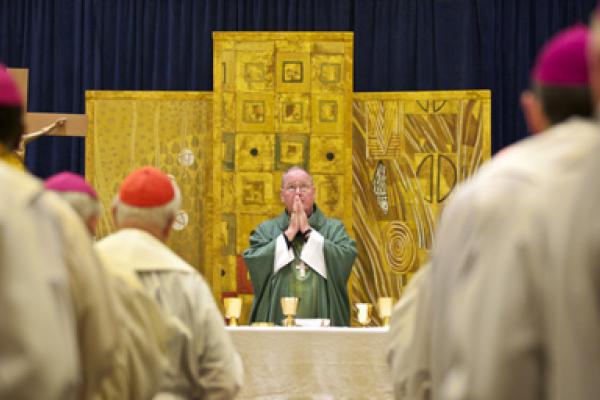Whenever I hear the term Common Good I think of Thomas Paine’s infamous pamphlet Common Sense,which challenged the British government and the royal monarchy, but did not challenge the institution of slavery. As an African-American woman I enter the Common Good conversation cautiously because I know that in our society we have a habit of taking what is good for Western hegemony and making it the standard for everyone else.
As we pursue the Common Good, let us remember what was once considered common and good during earlier points in American history: chattel slavery, indigenous genocide, and institutionalized sexism. To truly come to a Common Good, we need to honor a diversity of voices and challenge our assumptions about what is common and what is good. Our default is to take what is good for our culture, gender, or community and make it the common standard for all. I have experienced being invited into organizations that were aiming to do good in the world, but an expectation existed that I would be silent about my unique concerns as an African woman. I know that denying my reality can never be good for my spiritual, physical, or social well being.
Pope Francis on Wednesday said women play a “fundamental role” in the Catholic Church as those who are mostly responsible for passing on the faith from one generation to the next.
While the new pope stopped far short of calling for women’s ordination or giving women more decision-making power in the church, his remarks nonetheless signaled an openness to women that’s not often seen in the church hierarchy.
“In the church and in the journey of faith, women have had and still have a special role in opening doors to the Lord,” the Argentine pontiff said during his weekly audience in St. Peter’s Square.
The effects of the federal funding sequester are beginning to hit, and it’s not a pretty picture. Amanda Terkel and Sam Stein at Huffington Post write that while the damage is being downplayed, it is very real and painful.
“Organizations and companies have begun laying off workers, while many more have decided not to staff vacant positions. Schools on military bases are contemplating four-day weekly schedules. Food pantries have closed, as have centers that provide health services. Farmers have been forced to go without milk production information, causing alarm in the dairy industry and the potential of higher milk prices. Workers at missile-testing fields are facing job losses. Federal courts have closed on Fridays. Public Broadcasting transmitters have been shut down.”
They go on to list 100 specific stories from the past week of cuts that are taking place across the country. It’s a broad swath effecting many thousands of people. And the longer it goes on, the worse it will become.
Labels can be helpful when, for instance, applied to cans of soup or barrels of toxic waste. But they are less so when affixed to human beings – particularly when labels are meant to summarize, indelibly, one’s spiritual identity.
In a recent Rolling Stone interview, Marcus Mumford, the 26-year-old lead singer of the wildly successful British band Mumford & Sons, raised the hackles of religious folks (in some quarters) when he declined to claim the “Christian” label as his own.
You see, Marcus is the son of John and Eleanor Mumford, who are the national leaders of the Vineyard Church in the U.K. and Ireland, an arm of the international evangelical Christian Vineyard Movement. Last year, he married actress Carey Mulligan, whom he’d met years earlier at a Christian youth camp.
And the music of Mumford & Sons, for which Mumford is the main lyricist, is laden with the themes and imagery of faith – often drawing specifically upon the Christian tradition. They explore relationships with God and others; fears and doubts; sin, redemption, and most of all, grace.
Nuanced or not, are Christians, especially evangelicals, perceived as being against things like peacemaking? Or is it that their version of peacemaking is backward looking toward some halcyon day of yore (or 1950s America)? At this point in the book, Rob spends a lot of time walking us through the development of justice in the Bible from “eye-for-an-eye” to “turn the other cheek.” I want you to read this chapter for yourself and make your own conclusions about what Rob sees and tell me if you see it, too.
Rob's thinking is that people are gradually cluing in to God's vision of a world without retributive violence. “Revenge always escalates,” he writes. Always.
The Associated Press announced Tuesday it is dropping the term "illegal immigrant" from its Stylebook. Citing concern for “labeling people, instead of behavior,” AP’s Senior Vice President and Executive Editor, Kathleen Carroll, wrote, “The Stylebook no longer sanctions the term 'illegal immigrant' or the use of 'illegal' to describe a person. ...'Illegal' should describe only an action.”
This change is a huge win for those working on immigration reform, including the staff at Sojourners. Last fall, Sojourners joined many others in calling on the Associated Press to change the term.
“The media’s usage of the word 'illegal' is dehumanizing and distorting," wrote Sojourners Immigration Campaigns Fellow Ivone Guillen in October. "When used by journalists, it introduces a bias into their reporting and risks prejudicing the reader against the needs, concerns, and humanity of immigrant communities, regardless of their documentation status.”
Lego is defending its “Star Wars”-based Jabba the Hutt toy set after a Turkish cultural group said it promulgates negative stereotypes of Muslims.
Earlier this year, the Turkish Cultural Community of Austria criticized the Danish toy company, saying the Jabba’s Palace set was insensitive because of its similarity to Muslim mosques.
“The terrorist Jabba the Hutt likes to smoke a hookah and have his victims killed,” said the statement, reported by the Austrian Times. “It is clear that the ugly figure of Jabba and the whole scene smacks of racial prejudice and vulgar insinuations against Asians and Orientals as people with deceitful and criminal personalities.” Earlier this year, the Turkish Cultural Community of Austria criticized the Danish toy company, saying the Jabba’s Palace set was insensitive because of its similarity to Muslim mosques.
When New York Cardinal Timothy Dolan told national news programs on Easter Sunday that Catholic leaders need to do a better job of showing that their opposition to gay marriage is not “an attack on gay people,” the nation’s top Catholic bishop seemed to be signaling an important shift in tone, if not policies, that acknowledges two new realities.
One is the election of a new pope, Francis, who in less than a month has demonstrated a clear preference for engagement and inclusion (washing the feet of women and Muslim inmates at a Rome youth prison, for example) rather than the confrontation and political purism that often found favor under his predecessor, Benedict XVI.
The other is the ongoing shift in favor of same-sex marriage in the court of public opinion and — if recent arguments on Proposition 8 and the Defense of Marriage Act are any guide — perhaps soon in the U.S. Supreme Court.
Immediately following the election of Cardinal Jorge Mario Bergoglio as Pope came the predictable speculation. From the United States and other wealthy nations, folks wondered what the new Pope would say about issues related to gender and human sexuality. What about birth control, homosexuality, and women’s leadership in the church? Did the new Pope really support civil unions for gay and lesbian couples in Argentina, as some reported? Others, including many from Latin America, Africa, and parts of Asia responded to Pope Francis’ commitment to a simple lifestyle and his commitment to economic justice. While some fretted about his relationship with the Argentinian military dictatorship during the 1970s and 1980s, most have been impressed with his social witness. In one of his first public acts, Pope Francis entered a youth detention center in Rome and washed the feet of young offenders.
Lots of observers might wonder, “Why is the church expending so much energy on controversial social issues? Shouldn’t the church focus on spiritual matters rather than concerns of the flesh? Why does the church need to meddle in matters that lie beyond its purview?”
The Easter stories offer a direct answer. Whether we agree with the Pope or not, Christians care about human bodies. The resurrection story implies that bodies matter. Jesus’ resurrection is not merely a spiritual thing – the apparition of his ghost, or his ongoing spiritual influence. The Gospels all insist that the resurrection includes Jesus’ body.






